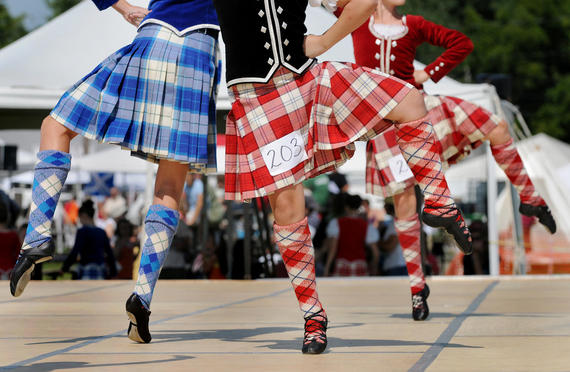[This piece first appeared in Quail Bell Magazine, a place for real and unreal stories from across the world.]
I remember sitting in my sixth grade classroom poised to take a standardized test. My big, curly hair sat in a high ponytail. My light olive hand clutched a pencil. The florescent lights might as well have been a spotlight. Before the test began, I was faced with every multicultural child's fear: the question of choosing my race or ethnicity.
My mother hails from El Salvador and my father is not too many generations removed from the Orricks who ventured from Scotland to Cumberland, Maryland in the 1800s. That would make me Salvadorian-Scottish-American, a Hispanic white-mestizo mix. But that's rarely an option on such surveys and it certainly wasn't in the year 2000. A more accurate survey would allow users to select "Hispanic" as an ethnicity and then something else as a race.
There are plenty of black and white Hispanics, for example, not just mestizos -- people of mixed European and Amerindian descent, the race that describes most Latin Americans. Of course, mestizo is virtually never an option. When it is, the word is usually lumped in with "Hispanic." Not that I'm the biggest fan of such a prying question in the first place, but if you're going to ask it, at least lay out all the possible choices.
As a Salvadorian-Scottish-American, the issue of "choice" is first in my mind these days. In print, on the airwaves, and online, the debates on how to handle the mass immigration of Central American children into the United States and whether Scotland should vote for independence seem to speak directly with my rational and emotional sides. And both of those sides believe that the Scotts and Central Americans deserve the power of choice.
For anyone who says Central America has no right to send their children across the border, I would say freedom is not a limited commodity. I would tell anyone against Scottish independence the same. Respect people to make their own choices and help them when necessary. Let's not be paternalistic. What we think is best doesn't matter. We can't know what is best for the future of another nation. That applies to the future of Scotland as much as it does the future of Central America.
We don't have the right to tell Central Americans what's best for their children. They know what's best for their children. And what seems best for them is to leave highly vulnerable and violent situations in their hometowns. Hate groups try to guilt-trip these desperate parents for sending their children away. Well, if they're going to play that game, they should know that the U.S. played a large role in creating the poverty and crime that run rampant in Central America today.
Take U.S. involvement in El Salvador's civil war, for instance, and suddenly there's another party to guilt trip. There is enough room on Earth for everyone, but some places are unsafe right now. Self-governance means allowing people to decide for themselves what unsafe means and how to protect themselves.
Speaking of self-governance, Scotland will have the chance to vote for or against remaining in the United Kingdom on Sept. 18th. Right now polls show it's a close call. Regardless of which way the vote goes, it's not for England, the United States, and the rest of the world to judge. There are many downsides of Scottish independence, but we shouldn't underestimate the importance of national pride, identity, and expression. These are matters we cannot qualify, nor is it our place to do so. This is not something we as outsiders can understand.
Many Scots feel shackled under English rule, perhaps the way the American Colonists did under English rule or the Haitians under French rule or the Mexicans under Spanish rule. Again, there is enough freedom to go around. So if that's what the Scots want, why not let them have it? May they deal with the consequences -- consequences we should not assume they don't understand. Just as Central American parents know their children will face dangers crossing the border, the Scots know that independence will come with its own challenges.
But may they have and own that choice.

